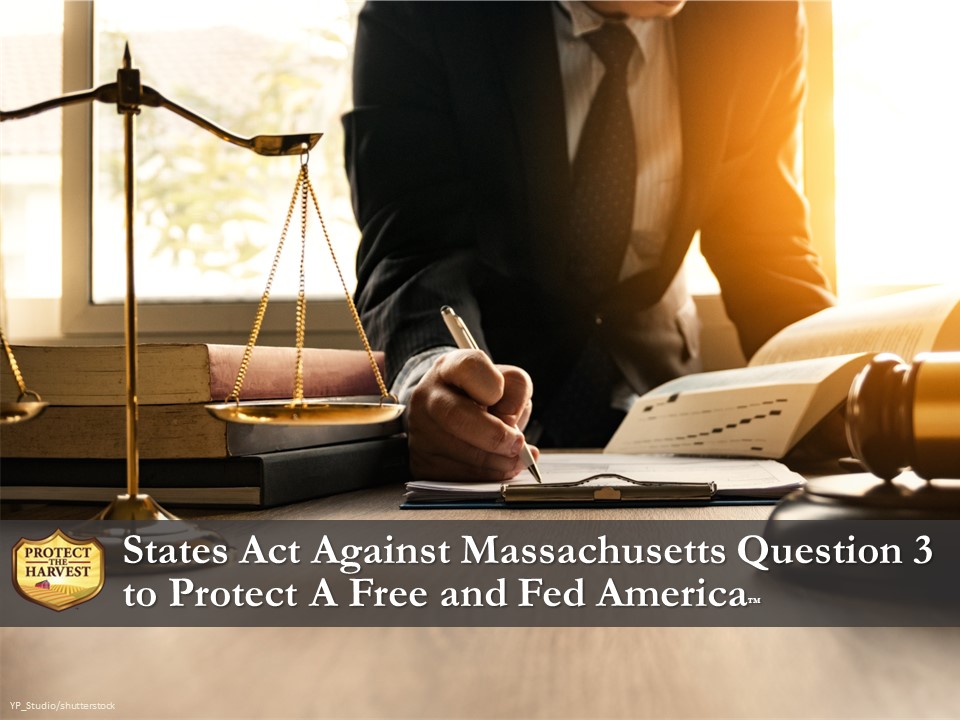In a recently filed amicus brief in the United States District Court for the District of Massachusetts, a 13-state coalition that includes Iowa, Louisiana, Mississippi, Missouri, Montana, Nebraska, New Hampshire, North Dakota, Oklahoma, South Carolina, South Dakota, Utah, and Wyoming, unequivocally lend their support to plaintiffs challenging the constitutionality of Massachusetts’s Question 3, known as the Prevention of Farm Animal Cruelty Act. The legal dispute, denoted as Civil Action No. 1:23-cv-11671-WGY, revolves around the potential repercussions of this legislation on the nation’s agricultural production and food security.
The central issue put forth by the amici curiae is that Question 3 establishes a dangerous precedent that could trigger a “race to the bottom” among states. The states argue that Massachusetts, a jurisdiction with minimal hog farming and pork processing activities, imposes regulations on these food businesses that deviate from well established national standards. The disparity in expertise and economic investment between Massachusetts and major pork-producing states, exemplified by Iowa, highlights the potential effects of enacting legislation without due consultation and consideration of science and fact-based industry practices.
One of the primary concerns raised in the amicus brief is the adverse impact Question 3 could have on out-of-state farmers. The states cite economic studies conducted in the context of California Proposition 12 to estimate the compliance costs for hog producers across the United States. These costs, projected to range between $294 million and $348 million, could disproportionately affect small, independent, family owned, hog farms. The brief suggests the otherwise unnecessary financial strain may lead to business closures and subsequently contribute to additional concentration of hog production among larger farms. The long-term adverse impact would be higher food prices for American’s.
Moreover, the states argue that Question 3 potentially violates multiple U. S. Constitution provisions, including the Commerce Clause, Import-Export Clause, and Full Faith and Credit Clause. The Commerce Clause is invoked to highlight concerns about the extraterritorial reach of Massachusetts’s regulations, which may interfere with interstate commerce by imposing burdensome requirements on pork producers in other states. America’s founders recognized the potential threat states could wield if they could arbitrarily impose harmful regulations against other states. The Import-Export Clause, according to the amici curiae, may be violated due to the conditions Question 3 places on the sale of pork originating from other states, conflicting with the original intent of this constitutional provision. Additionally, the Full Faith and Credit Clause is implicated, as Question 3 may run afoul of principles prohibiting states from adopting policies hostile to the public acts of other states.
In summary, the amicus brief underscores the far-reaching consequences of the ill-conceived, misinformation, and animal rights advocate aspects of Question 3 on pork farmers and consumers nationwide. By challenging the legislation’s constitutionality, the states aim to prevent a potential domino effect of ill-informed and burdensome regulations, safeguarding the integrity of interstate commerce and the economic interests of hog farmers across the country. We commend states willing to stand for A Free and Fed America™ and protect our nation’s food supply.
For additional information about Massachusetts Question 3, California Proposition 12, Oregon IP3 and other similar state initiatives that pose threats to American agriculture, family farmers, and consumers, please visit our website.



